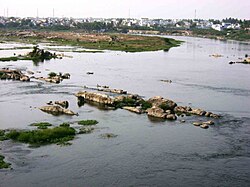Erode City
| Erode | |
|---|---|
| City | |

River Kaveri at Erode.
|
|
| Nickname(s): Turmeric City Textile City |
|
| Location in Tamil Nadu, India | |
| Coordinates: 11°21′N 77°44′E / 11.350°N 77.733°ECoordinates: 11°21′N 77°44′E / 11.350°N 77.733°E | |
| Country | India |
| State | Tamil Nadu |
| District | Erode District |
| Taluka | Erode |
| Government | |
| • Type | Municipal Corporation |
| • Body | Erode Municipal Corporation |
| Area | |
| • Total | 109.52 km2 (42.29 sq mi) |
| Elevation | 183 m (600 ft) |
| Population (2011) | |
| • Total | 521,776 |
| Languages | |
| • Official | Tamil |
| Time zone | IST (UTC+5:30) |
| PIN | 63800x |
| Telephone code | 91 (424) |
| Vehicle registration | TN-33, TN-86, TN-56 |
| Website | erodecorporation |
Erode ([iːroːɽɯ]) is the seventh largest urban agglomeration of the South Indian state, Tamil Nadu and serves as administrative headquarters of Erode District. Administered by a municipal corporation since 2009, Erode is a part of the Erode Lok Sabha constituency that elects its member of parliament. Located on the banks of River Kaveri, it is situated centrally on the South Indian Peninsula, about 400 kilometres (249 mi) southwest of its state capital Chennai and about 80 kilometres (50 mi) east of Coimbatore. Erode is an agricultural, textile and a BPO hub and among the largest producers of turmeric,hand-loom and knitwear,food products.
The name "Erode" might have its origin in the Tamil phrase Eru Odai meaning two streams based on the presence of the two water courses of Perumpallam and Kalingarayan Canal. Alternatively, it might have been derived from the Tamil phrase Eera Odu meaning wet skull, based on Indian mythology. During the Sangam age, the Erode region formed a part of the historical Kongu Nadu region ruled by Cheras and then by the Kalabhras who were ousted by the Pandyas around 590 CE. Afterwards, it was ruled by Rashtrakutas and by Cholas from the 10th to the early 13th century, when Erode briefly came under the rule of the Delhi Sultanate. Erode was annexed by the Vijayanagar Empire in 1378 CE until gaining independence in 1559 CE by Madurai Nayaks, who were defeated by Hyder Ali in 1736 CE. Consequent to the fall of Tipu Sultan of Mysore in 1799, Erode was controlled by the British East India Company with the Maharaja of Mysore as principal ruler. Erode remained under British rule until Indian independence in 1947.
...
Wikipedia

